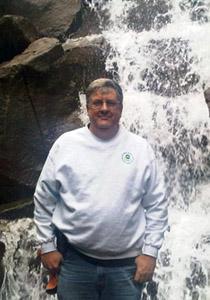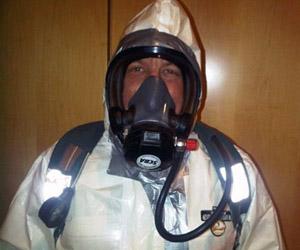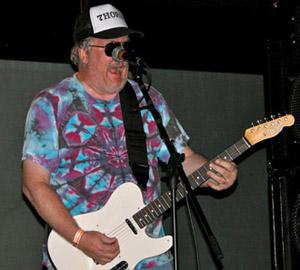Meet EPA Engineer Paul Lemieux, Ph.D.

Cleaning Up the Mess: EPA Homeland Security Decontamination Research
Paul Lemieux, Ph.D. works on issues related to clean up after chemical/biological/radiological attacks and foreign animal disease outbreaks. Paul has also been working to develop computer-based decision support tools to aid decision makers in responding to wide-area contamination incidents. He has been with EPA for 26 years studying the formation and control of pollutants from combustion and incineration systems. He is the Associate Division Director of the Decontamination and Consequence Management Division of U.S. EPA's National Homeland Security Research Center.
Why does your science matter?
My research looks at how we can best manage waste after a homeland security event, such as wide-spread chemical, biological, or radiological contamination. Waste management is a key component of responding to these types of incidents and is an important element of community resiliency.
EPA can provide scientific knowledge to help with the response and recovery efforts. A huge part of those efforts is the management of the resulting waste. It’s our job at EPA to make sure that waste is disposed of in such a way that it doesn’t harm human health and the environment.
Video profile: Decontamination and Clean-Up Research with Scientist Paul Lemieux Exit
What do you like most about your research?
I like that it is never the same from day to day. Since I've been doing homeland security research, I've done tests in the lab, at cement kilns, landfills, medical waste autoclaves, incinerators, rendering plants, and even at a building out in the middle of nowhere in Idaho. Also, the people I work with are awesome, both at EPA and in other parts of the government and the national labs. It is also gratifying to see the impact. Doing research to support EPA's emergency response community has a certain sense of "boots-on-the-ground reality", and my research can have a direct, positive impact on people at a time when they may be struggling to rebuild their lives following a disaster.

If you could have dinner with any scientist, past or present, who would you choose and what would you like to ask them?
I would choose Albert Einstein. I'd love to sit down with him over beers and have him run through his relativistic thought experiments with me.
When did you first know you wanted to pursue science?
I got turned on to science and engineering when I was a little kid. I watched the Mercury, Gemini, and Apollo programs systematically work their way up to putting a man on the moon, which incidentally happened on my 9th birthday on July 20, 1969.
Tell us about your science/educational background.
I got a bachelor’s of science degree in Chemistry from Seattle University and a PhD in Chemical Engineering from the University of Utah. I did my PhD work studying combustion of zirconium sponge, which is a by-product of the manufacturing process for fuel rods to be used in nuclear energy production.
- Experimental and theoretical studies on the combustion of waste zirconium sponge in a rotary kiln simulator Exit

If you were not a scientist, what do you think you would be doing?
I would probably be a starving musician. I play guitar in two bands, a comedy rock band called Jehovah's Witness Protection Program and a Black Sabbath tribute band called Bloody Sabbath. It's more fun than a person should be allowed to have, but I'm glad to have my day job because I need to eat.
Any advice for students considering a career in science?
Be open-minded about what you study and with whom you work. I would have never thought that I would be doing what I'm doing now back when I was an undergraduate chemistry student or even a graduate student in chemical engineering. Be willing to broaden your experiences and work with people who aren't in your chosen field. It has been very rewarding for me as an engineer to work with EPA toxicologists and microbiologists. Also try hard to be aware of the things you don't know. You cannot possibly know everything about everything, and being aware of your own limitations is key in today's multidisciplinary research environment.
